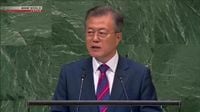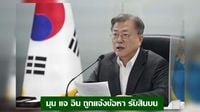In a dramatic turn of events, former South Korean President Moon Jae-in has been indicted on corruption charges, marking a significant shift in the political landscape of the country. The indictment, announced by the Jeonju District Prosecutors' Office on April 24, 2025, alleges that Moon received bribes totaling approximately 217 million won (around 5 million baht) in connection with the employment of his son-in-law at the airline Thai Eastar Jet. This development thrusts Moon, who previously enjoyed a scandal-free reputation during his presidency from 2017 to 2022, into the spotlight of legal scrutiny.
According to reports from The New York Times, the charges stem from allegations that Moon facilitated the appointment of his son-in-law, Seo, to a managerial position at the airline despite Seo's lack of relevant experience in the aviation industry. Prosecutors claim that the financial benefits provided to Seo were disguised as legitimate salary payments but were, in fact, bribes intended to secure Moon's influence. The prosecution asserts that Moon's actions have compromised the integrity of the airline's management and raised serious concerns about corruption within the government.
During his presidency, Moon was known for his progressive policies, particularly regarding social welfare and reconciliation efforts with North Korea. However, the recent indictment adds to a troubling trend for South Korean leaders. Following Moon, his predecessor, Yun Seok-yeol, was also removed from office amid allegations related to national security and corruption. This pattern suggests that all elected leaders in South Korea since 2002 have faced legal challenges or controversies after leaving office.
The political ramifications of Moon's indictment are profound. With the country gearing up for a critical presidential election on June 3, 2025, the opposition party, led by Lee Jae-myung, is positioning itself as a viable alternative. Lee, who survived a violent knife attack last year, is calling for an end to the confrontational nature of South Korean politics. He has accused the current government of using legal means to suppress political rivals.
In response to the charges, Moon has vehemently denied any wrongdoing, labeling the indictment as "absurd and shocking." He views it as a politically motivated attack following Yun's impeachment. Moon's legal team is preparing to contest the allegations, arguing that the prosecution has not provided sufficient evidence to support its claims.
The investigation into Moon's dealings began in 2021 after civil society groups raised concerns about potential corruption. Prosecutors allege that the financial transactions involving his son-in-law occurred between 2018 and 2020, during which time Moon was in office. The accusations have sparked outrage among his supporters, who argue that the charges are an attempt to undermine his legacy.
Adding to the complexity of the situation, the former parliament member involved in the case, Lee Sang-jik, has also been indicted on separate bribery charges. He allegedly secured his position as the head of the Small and Medium Enterprises and Startups Agency in exchange for facilitating Seo's employment at Thai Eastar Jet. Lee's involvement further complicates the narrative and raises questions about the broader implications of corruption within South Korea's political and business sectors.
As the legal proceedings unfold, the implications for South Korea's political future remain uncertain. The upcoming election is expected to be heavily influenced by the ongoing scandal, with both the ruling party and the opposition scrambling to position themselves advantageously. Political analysts warn that the public's perception of corruption could sway voter sentiment, potentially reshaping the country's political landscape.
Furthermore, the issue of national security looms large in the background. The ongoing tensions with North Korea and the need for stable governance during this critical period have prompted calls for transparency and accountability from all political figures. The investigation into Moon's alleged misconduct may serve as a litmus test for the public's trust in the political system.
In light of these developments, the South Korean public is left grappling with the implications of the indictment. As the nation prepares for the upcoming election, citizens are keenly aware of the need for integrity and ethical governance. The outcome of this scandal could have lasting effects on the political landscape, shaping the future of South Korea for years to come.
In conclusion, Moon Jae-in's indictment on corruption charges marks a pivotal moment in South Korean politics, highlighting the ongoing struggles with corruption and accountability among political leaders. With the election on the horizon, the ramifications of this case will undoubtedly resonate throughout the country, influencing public opinion and the future direction of governance.





